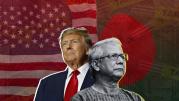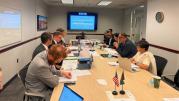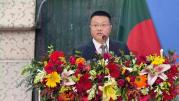BNP Standing Committee Member Amir Khosru Mahmud Chowdhury on Friday described the US administration's move to reduce tariffs on Bangladeshi products—from 35% to 20%—as a "satisfactory development" for the country's export sector.
"We've learned that the US has set the tariff rate for Bangladesh at 20%. Compared to our competitors—Pakistan at 19%, Vietnam at 20%, and India at 25%—I think the figure is overall satisfactory," he said.
Talking to reporters about the US decision, the BNP leader, however, said the full impact of the US decision on Bangladesh's economy can't be judged yet as the complete details of the negotiation are still unknown.

This is a significant step down from the previously proposed 37% tariff, but may still have a sizeable impact on the country’s shipments to its single-biggest export destination
"In this context, I believe, the tariff figure is satisfactory when we consider competition. If we compare it with other countries, the rate seems to be reasonable. So, this is satisfactory," he observed.
However, pointing to what might be behind the new tariff rate, Khosru, a former commerce minister, said the full picture of the negotiation process is not yet clear. "So far, only the tariff rate has been shared."
Without knowing what Bangladesh may have agreed to give in return, he said it is not possible to assess the full impact of the decision.
In reply to a question, the BNP leader said many issues were discussed as part of a full package during the negotiation. "There were several decisions made. It's not just about how much the tariff was reduced."

Informal discussions were held on Tuesday, with the talks to resume on Wednesday at 9am local time
"There were a lot of talks behind this. What the Americans will be allowed to export, what their demands were, and what conditions they put forward—when these details are made public, we will better understand the full situation," he said.
When asked whether Bangladeshi businessmen, who were worried about extra US tariffs, now feel some relief, the former commerce minister said, "I think the 20% tariff won't affect our export market for now. So, at this point, this is a satisfactory decision."
When asked if the Commerce Secretary's recent remarks about buying 25 Boeing aircraft from the US are linked to the tariff decision, Khosru said, "No, but something had to be done. The whole issue of extra tariffs is about the US wanting to protect its export interests. That's why these additional tariffs were put in place."
The BNP leader said it is important to discuss how much Bangladesh can absorb—how much the economy can handle, how much the business community can manage, and to what extent the overall economy can bear the impact. "We must remember, this is not just about tariffs. There are many other related matters. We need to look at all of them together."
He, however, said Bangladesh's exporters may feel some sort of relief for now following the US decision on tariff cuts.
Khosru also said the interim government should disclose the full background and details of the US decision. "Our trade is not just with America as we export to many other countries. We must consider all of them to understand where we stand and to properly review our position."

The envoy said that since the Trump administration took office, the US has rolled out a series of unilateral tariffs, including so-called 'reciprocal tariffs', a textbook case of trade bullying.
At the same time, he said Bangladesh must work to diversify its exports—both in terms of products and markets. "We cannot have an economy that depends only on the US. We need to expand our exports to new markets and with new products. That will be one of the biggest challenges in the coming days."
The United States has reduced the tariff on Bangladeshi goods to 20%, down from 35%, after final high-level negotiations in Washington.
The White House confirmed the new rate on Friday. It is expected to give a big boost to Bangladesh's exports, especially in the garment sector. The agreement came after a series of meetings between Bangladeshi officials and the Office of the United States Trade Representative, which handles US trade policy.



Comments